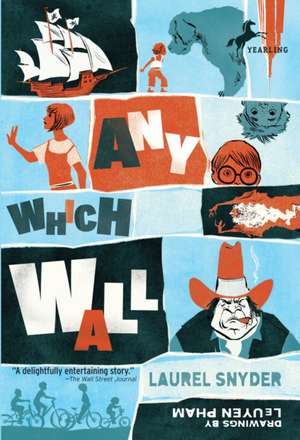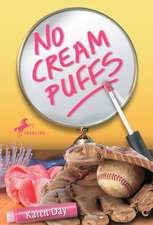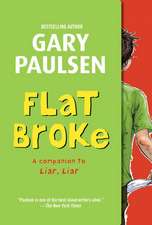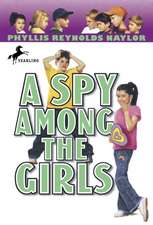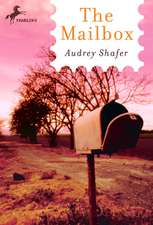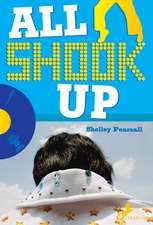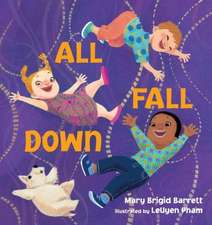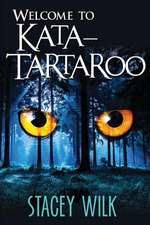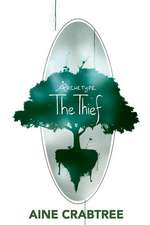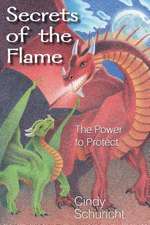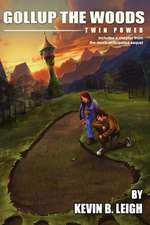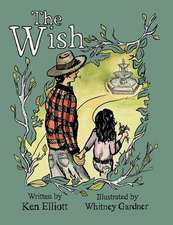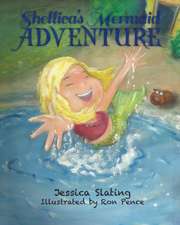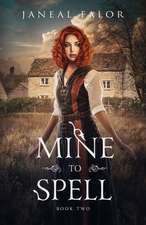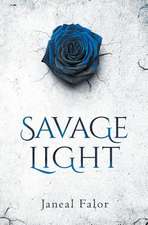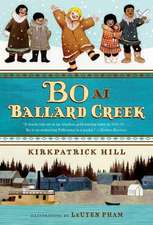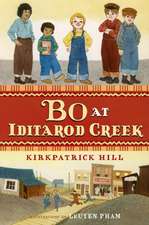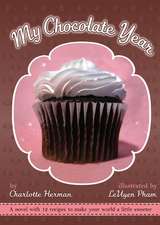Any Which Wall
Autor Laurel Snyder Ilustrat de Leuyen Phamen Limba Engleză Paperback – 30 apr 2010 – vârsta de la 8 până la 12 ani
If you had a magic wall that could take you to any place and any time, where would you go? Would you want to visit castles and desert islands? Would you want to meet famous wizards, terrible pirates, beautiful queens, and dastardly outlaws? If so, then you are just like Henry and Emma, and Roy and Susan—and you will probably like this story a lot. In fact, you might even wish something similar would happen to you!
In Any Which Wall, author Laurel Snyder proves that you don’t have to be an orphan, know a dragon, or even be a child to get a taste of magic. You just have to keep your mind open and willing to let it happen. And when you do find magic (like Henry, Emma, Roy, and Susan), you might be surprised that along with all the fun, you also find out new things about your friends, your family, and maybe even a little bit about who you really want to be.
From the Hardcover edition.
Preț: 49.71 lei
Nou
Puncte Express: 75
Preț estimativ în valută:
9.51€ • 9.96$ • 7.92£
9.51€ • 9.96$ • 7.92£
Carte tipărită la comandă
Livrare economică 31 martie-14 aprilie
Preluare comenzi: 021 569.72.76
Specificații
ISBN-13: 9780375855610
ISBN-10: 0375855610
Pagini: 245
Dimensiuni: 132 x 193 x 18 mm
Greutate: 0.2 kg
Editura: Yearling Books
ISBN-10: 0375855610
Pagini: 245
Dimensiuni: 132 x 193 x 18 mm
Greutate: 0.2 kg
Editura: Yearling Books
Notă biografică
Laurel Snyder’s first novel, Up and Down the Scratchy Mountains, and her first picture book, Inside the Slidy Diner, have delighted readers both young and old. She wrote Any Which Wall as a tribute to Edward Eager and Edith Nesbit, both of whom have influenced her work. She and her family live in Atlanta, Georgia. Visit her online at www.laurelsnyder.com.
From the Hardcover edition.
From the Hardcover edition.
Extras
“Wow,” said Henry, staring up.
Everyone agreed: the wall was “wow.” It looked like something from another place and time, ancient and mysterious, leaning over them. They just stood.
Gaping. Up.
“It’s so big,” said Roy after a while. “What do you think it was? I mean, what did it start out as, back when it was built?”
“A castle!” Emma answered right away with absolute certainty. “A big giant castle. For when people needed to hide from Indians and wolves and for olden-time princesses to stay in when they visited Iowa.”
“Mmmmm. More likely a farmhouse,” said Susan.
“I don’t think there are a lot of castles in Iowa, Em–”
“Actually, Susan,” said Roy, “I don’t think a farmhouse makes any more sense than a castle. It’s too huge for a house. Plus, if it were part of a house, it’d have some windows in it, right? And maybe a door?”
They all looked up and agreed that the wall didn’t have any windows in it, or doors either. Susan frowned.
“Maybe it was a really enormous barn?” Roy guessed. “But it doesn’t matter much. The big question is, what can we do with it?”
The others agreed. Clearly, something so interesting and rare needed to be put to good use.
“I guess it could be a kind of fort,” said Susan at last, “if we leaned some branches against it, maybe. But they’d have to be really long branches.”
“And where would we get the branches from?” asked Roy, thinking practically. “Drag them from town?”
“Who cares!” said Henry impatiently. “We can figure out what to do with it later. In the meantime, we should claim it.”
“Claim it?” asked Emma.
“Yeah, Em. Like when someone finds a planet or walks on the moon or something. Or back in pioneer days, when they staked out homesteads in the Wild West. It’s our wall now. We found it, and we need to claim it before someone else does. Right, Roy?”
“We can if you want to.” Roy nodded thoughtfully.
“Although technically it belongs to whoever owns this field.”
Henry ignored this comment. Roy was his best friend and always had been, but sometimes it was necessary to ignore Roy in the name of fun. Henry wished his friend could understand that “technically” didn’t always matter.
“But what are we going to claim it with?” Henry asked. “We should have a flag or a sign or something, a way to let people know that it’s our wall. What have you guys got?”
They all emptied their pockets.
Henry had half a pack of very pungent bubble gum (the same gum that had left his hair a sticky mess), a handful of change, a crumpled dollar bill, the cell phone his mother made him carry, and a red rubber ball. Emma found one of the green handlebar tassels from her new bike (already pulled loose), a smiling-tooth sticker from the dentist’s office, and another crumpled dollar bill.
Susan found a tube of sparkle lip gloss, ten dollars (emergency money), a cell phone nobody ever had to remind her to carry, and a barrette. Roy found a funny looking rock, a compass, and a mouse skull, which is not nearly as gross as it sounds. He pulled the skull out last, and it gleamed fragile and white in his hand.
“I don’t know how we can make a sign or a flag with any of this stuff,” said Henry, “but that”–he pointed at the skull–“gives me another idea. You know what would be awesome?” The others did not know, so Henry told them. “We should have some kind of ceremony. Make a sacrifice and say a prayer of thanks, like when shipwrecked people find a desert island. To thank the spirits of the field, or whatever, for letting us find the wall.” Henry was excited. This would involve digging, jumping around, and make-believe: three of his favorite things.
Henry began to make a chanting noise that sounded like “Oh-ee-oh-ee,” and bowed down to the wall. After a while, he turned and looked back at the others, wondering why nobody else had joined in his wordless song. They were all just watching him.
“A sacrifice?” Emma looked nervous.
Henry stopped chanting and sighed. “I don’t mean a scary kind of sacrifice,” he explained. “I mean a fun sacrifice.”
“If we’re going to do a sacrifice, we should do it right,” said Susan. “A sacrifice should mean giving up something more than an old piece of bone.” She eyed the skull with distaste. “A sacrifice should be something
you care about. Something you want to keep. That’s the definition of sacrifice, isn’t it? That way, the spirits will know we’re serious.”
The others stared at her when she said the word “spirits.” This didn’t sound like the Susan they’d gotten used to over the last year, the Susan who ignored them and sometimes made fun of their games. This seemed more like the old Susan, and though they were delighted to welcome her return, they were all a little shocked.
She noticed them staring and stared right back, in a bug-eyed sort of way.
“What?” she said. “I just mean– you know, if there are spirits.”
Roy prodded her. “So, you think we need to give up something that matters to us?”
Susan nodded.
“Like . . . your cell phone?” asked Roy with a sneaky smile.
“Yeah,” said Henry, smirking. “You sure do like that.”
“No way,” said Susan, putting it back in her pocket immediately. “Absolutely not. Mom and Dad would kill me.”
“What about the money, then?” asked Emma.
Of all the things they were carrying with them, their money did seem like the only thing they had worth giving up, besides their two cell phones, which–everyone had to admit–they’d get skinned alive if they lost. It didn’t seem likely that the spirits of the field would want a plastic tassel or some gum, so while Roy dug a hole at the base of the wall, Susan collected Emma and Henry’s dollars.
“On second thought,” Susan asked, holding up the money, “do you think just the two is enough? Plus the change? I feel bad giving the rest away, since it’s not my money. It really belongs to Mom.”
“Yeah, sure,” said Henry. “Just take my dollar and Emma’s but keep your own money. That seems fair.”
Despite Henry’s grousing, they all agreed that two dollars should be plenty of sacrifice to gratify the spirits of the field, if there were such spirits. Last of all, Roy added the small white skull gently to the pile of money in the hole. It seemed right, since the mouse had likely been a field mouse. They all scrabbled the pile over with dirt.
When Henry’s hand touched something hot and smooth, he jumped back. “Ow!” he yelped.
“What is it?” asked Emma.
Henry bent to pick up the hot something-or-other, then held it up so that they could all see. It was a large skeleton key the size of a teaspoon, so caked with dirt that none of them had noticed it lying camouflaged on the ground. Henry wiped it against his shirt, and as the dirt flaked off, everyone saw it was made of a bronzy kind of metal, with a rough surface and fancy scrollwork at the top.
From the Hardcover edition.
Everyone agreed: the wall was “wow.” It looked like something from another place and time, ancient and mysterious, leaning over them. They just stood.
Gaping. Up.
“It’s so big,” said Roy after a while. “What do you think it was? I mean, what did it start out as, back when it was built?”
“A castle!” Emma answered right away with absolute certainty. “A big giant castle. For when people needed to hide from Indians and wolves and for olden-time princesses to stay in when they visited Iowa.”
“Mmmmm. More likely a farmhouse,” said Susan.
“I don’t think there are a lot of castles in Iowa, Em–”
“Actually, Susan,” said Roy, “I don’t think a farmhouse makes any more sense than a castle. It’s too huge for a house. Plus, if it were part of a house, it’d have some windows in it, right? And maybe a door?”
They all looked up and agreed that the wall didn’t have any windows in it, or doors either. Susan frowned.
“Maybe it was a really enormous barn?” Roy guessed. “But it doesn’t matter much. The big question is, what can we do with it?”
The others agreed. Clearly, something so interesting and rare needed to be put to good use.
“I guess it could be a kind of fort,” said Susan at last, “if we leaned some branches against it, maybe. But they’d have to be really long branches.”
“And where would we get the branches from?” asked Roy, thinking practically. “Drag them from town?”
“Who cares!” said Henry impatiently. “We can figure out what to do with it later. In the meantime, we should claim it.”
“Claim it?” asked Emma.
“Yeah, Em. Like when someone finds a planet or walks on the moon or something. Or back in pioneer days, when they staked out homesteads in the Wild West. It’s our wall now. We found it, and we need to claim it before someone else does. Right, Roy?”
“We can if you want to.” Roy nodded thoughtfully.
“Although technically it belongs to whoever owns this field.”
Henry ignored this comment. Roy was his best friend and always had been, but sometimes it was necessary to ignore Roy in the name of fun. Henry wished his friend could understand that “technically” didn’t always matter.
“But what are we going to claim it with?” Henry asked. “We should have a flag or a sign or something, a way to let people know that it’s our wall. What have you guys got?”
They all emptied their pockets.
Henry had half a pack of very pungent bubble gum (the same gum that had left his hair a sticky mess), a handful of change, a crumpled dollar bill, the cell phone his mother made him carry, and a red rubber ball. Emma found one of the green handlebar tassels from her new bike (already pulled loose), a smiling-tooth sticker from the dentist’s office, and another crumpled dollar bill.
Susan found a tube of sparkle lip gloss, ten dollars (emergency money), a cell phone nobody ever had to remind her to carry, and a barrette. Roy found a funny looking rock, a compass, and a mouse skull, which is not nearly as gross as it sounds. He pulled the skull out last, and it gleamed fragile and white in his hand.
“I don’t know how we can make a sign or a flag with any of this stuff,” said Henry, “but that”–he pointed at the skull–“gives me another idea. You know what would be awesome?” The others did not know, so Henry told them. “We should have some kind of ceremony. Make a sacrifice and say a prayer of thanks, like when shipwrecked people find a desert island. To thank the spirits of the field, or whatever, for letting us find the wall.” Henry was excited. This would involve digging, jumping around, and make-believe: three of his favorite things.
Henry began to make a chanting noise that sounded like “Oh-ee-oh-ee,” and bowed down to the wall. After a while, he turned and looked back at the others, wondering why nobody else had joined in his wordless song. They were all just watching him.
“A sacrifice?” Emma looked nervous.
Henry stopped chanting and sighed. “I don’t mean a scary kind of sacrifice,” he explained. “I mean a fun sacrifice.”
“If we’re going to do a sacrifice, we should do it right,” said Susan. “A sacrifice should mean giving up something more than an old piece of bone.” She eyed the skull with distaste. “A sacrifice should be something
you care about. Something you want to keep. That’s the definition of sacrifice, isn’t it? That way, the spirits will know we’re serious.”
The others stared at her when she said the word “spirits.” This didn’t sound like the Susan they’d gotten used to over the last year, the Susan who ignored them and sometimes made fun of their games. This seemed more like the old Susan, and though they were delighted to welcome her return, they were all a little shocked.
She noticed them staring and stared right back, in a bug-eyed sort of way.
“What?” she said. “I just mean– you know, if there are spirits.”
Roy prodded her. “So, you think we need to give up something that matters to us?”
Susan nodded.
“Like . . . your cell phone?” asked Roy with a sneaky smile.
“Yeah,” said Henry, smirking. “You sure do like that.”
“No way,” said Susan, putting it back in her pocket immediately. “Absolutely not. Mom and Dad would kill me.”
“What about the money, then?” asked Emma.
Of all the things they were carrying with them, their money did seem like the only thing they had worth giving up, besides their two cell phones, which–everyone had to admit–they’d get skinned alive if they lost. It didn’t seem likely that the spirits of the field would want a plastic tassel or some gum, so while Roy dug a hole at the base of the wall, Susan collected Emma and Henry’s dollars.
“On second thought,” Susan asked, holding up the money, “do you think just the two is enough? Plus the change? I feel bad giving the rest away, since it’s not my money. It really belongs to Mom.”
“Yeah, sure,” said Henry. “Just take my dollar and Emma’s but keep your own money. That seems fair.”
Despite Henry’s grousing, they all agreed that two dollars should be plenty of sacrifice to gratify the spirits of the field, if there were such spirits. Last of all, Roy added the small white skull gently to the pile of money in the hole. It seemed right, since the mouse had likely been a field mouse. They all scrabbled the pile over with dirt.
When Henry’s hand touched something hot and smooth, he jumped back. “Ow!” he yelped.
“What is it?” asked Emma.
Henry bent to pick up the hot something-or-other, then held it up so that they could all see. It was a large skeleton key the size of a teaspoon, so caked with dirt that none of them had noticed it lying camouflaged on the ground. Henry wiped it against his shirt, and as the dirt flaked off, everyone saw it was made of a bronzy kind of metal, with a rough surface and fancy scrollwork at the top.
From the Hardcover edition.
